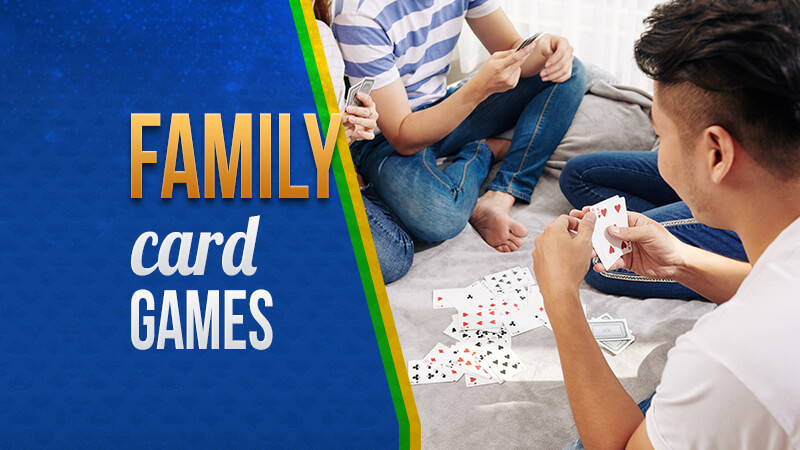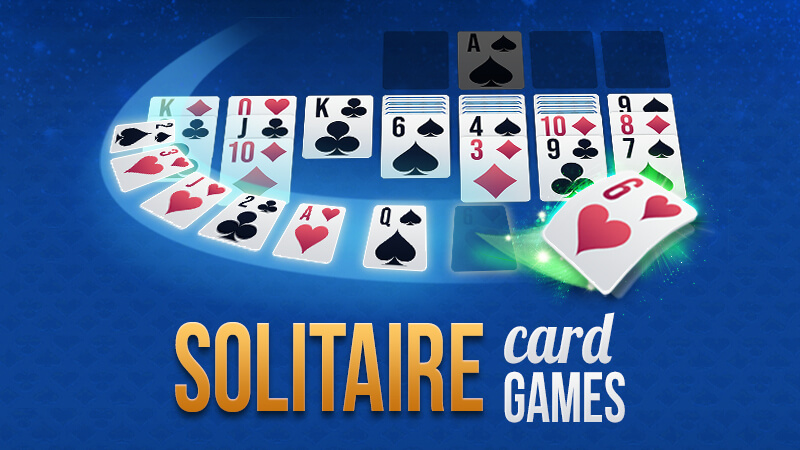10 Awesome Family Card Games

Table of contents
1. Go Fish
Each player is dealt five cards if there are 4 or more players, and seven cards if there are 3 or fewer players. The remaining cards form a draw pile in the center. Players take turns asking each other for specific cards to complete their sets. For example, you might ask, “Do you have any threes?” If the player you ask has any threes, they must give them to you.
If the player you ask doesn’t have the requested card, they respond with “Go Fish,” and you must draw a card from the central pile. If the drawn card is the one you asked for, you get another turn. Whenever a player collects four cards of the same rank, they place them face-up in front of them. The game continues until all sets are completed or the draw pile is empty.
The player with the most completed sets at the end of the game wins.
2. Crazy Eights
The dealer shuffles the deck and deals seven cards to each player. The remaining cards form the draw pile, and the top card is placed face-up beside it to start the discard pile. The goal is to play a card that matches the rank or suit of the top card on the discard pile. If a player can’t make a match, they must draw a card from the draw pile.
Eights are special cards in Crazy Eights. When played, they allow the player to change the suit to whatever they desire. The first player to get rid of all their cards is declared the winner.
3. Old Maid
Players examine their cards and remove any pairs from their hands, placing them face-up on the table. Pairs are safe and no longer part of the game. Players take turns offering their hands to another player, who draws one card without looking. If the player forms a pair with the card they drew, they place it face-up on the table. If not, they add it to their hand.
The game continues until all pairs have been formed and placed face-up. The player who holds the Old Maid last is the loser.
4. Spoons
The dealer begins by taking a card from the draw pile and then passing one card to the left. This process continues with players taking a card from the person to their right and passing one card at a time. As soon as a player collects four cards of the same rank, they discreetly take a spoon from the center. When other players notice someone grabbing a spoon, they must do the same.
The player left without a spoon receives a letter (S, P, O, O, N) and is one step closer to being “out.” The game continues until only one player remains without a spoon, and they are declared the loser.
5. Snap
When two consecutive cards match in rank, the first player to shout “Snap!” and place their hand on the central pile wins the entire pile and adds it to the bottom of their stack.
If a player mistakenly calls “Snap!” when there isn’t a match or hesitates, they must give one card from their stack to the player who correctly called “Snap!” The player who collects all the cards or reaches a predetermined number first wins the game.
6. Uno
There are also action cards, including Skip (skips the next player’s turn), Reverse (reverses the order of play), and Draw Two (forces the next player to draw two cards). Additionally, there are Wild cards that allow the player to choose the next color and Wild Draw Four cards, which both change the color and force the next player to draw four cards.
While Uno is known for its element of luck, strategic play can significantly improve your chances of winning. For example, try to change the color to one that you have more of in your hand, making it more likely that you can play multiple cards in a row. Use Skip and Reverse cards to disrupt opponents’ plans and give yourself an advantage.
Sometimes, it’s wise to hold onto Action cards until they are truly needed. Bluffing can make other players hesitant to challenge your plays. When a player plays a Wild Draw Four, don’t forget you can challenge it if you suspect they had a valid move. And always remember to call “Uno” when you have one card left to avoid drawing extra cards.
7. Skip-Bo
There are four shared building piles in the center, and each player can contribute to them. These piles are built up in ascending order, starting from 1 to 12. Players can play cards from their stockpile, as well as draw from a separate draw pile to keep the building piles going. Players have a discard pile where they place cards they can’t play or choose not to play on their turn. Discard piles can also be used strategically to block opponents or to set up future plays.
To excel at Skip-Bo, players must simultaneously manage their stockpile, the building piles, and their discard pile. The game requires a balance between strategic planning and adaptability, as well as the ability to create and exploit opportunities as they arise.
8. Hearts
In the initial phase of Hearts, players pass three cards to an opponent in a counter-clockwise direction. This passing of cards is a crucial aspect of the game, as it can determine your strategy for the round. Players aim to pass undesirable high-point cards to their opponents while retaining low-point cards for themselves.
Once the passing phase is complete, the main part of Hearts begins, where players try to win tricks while avoiding certain cards that carry point penalties. The Queen of Spades is a high-value card to avoid at all costs, as it carries a hefty point penalty. Players must carefully track its location and be cautious about taking tricks containing this card.
You can also play Hearts with 3 players.
9. Rummy
Each player is dealt ten cards if there are 4 or more players and seven cards if there are 3 or fewer players. The remaining deck forms a draw pile, and the top card is placed face-up beside it to create a discard pile. The goal is to form valid combinations of cards in your hand, including sets and sequences.
On a player’s turn, they can draw one card from the draw pile or the top card from the discard pile. Afterward, they must discard one card onto the discard pile. The game continues until one player successfully forms valid combinations for all their cards, at which point they declare “Rummy” and win the round. The other players reveal their hands, and unformed combinations count as points against them.
The key to winning in Rummy lies in forming sets and sequences efficiently. The game has several popular variations, and if you want to know more, read our article about Rummy & Gin Rummy.
10. Whist
The last card dealt determines the trump suit. The objective of Whist is to win as many tricks as possible, with each trick consisting of four cards, one from each player. The player who plays the highest-ranked card of the trump suit or the highest-ranked card of the suit lead wins the trick for their team. The winning team gets to lead the next trick.
Each trick earns one point for the winning team. The game continues until all 13 tricks have been played. Understanding when to play high or low cards is crucial. Save high cards for crucial tricks and try to force opponents to play their high cards early.
Read more about Whist Card Game in our detailed guide.
Create a schedule or rotation system to give all your family members a chance to choose a game. Set aside dedicated game nights to make it a regular tradition that everyone can look forward to. Add some delicious snacks like popcorn, chips, and finger foods.
Set the mood with soft lighting, cozy blankets, and some background music. You can even introduce a small prize for the winner to add an element of competition and excitement. Don’t forget to put away all electronic devices.
Family card game nights have a unique ability to bring loved ones closer, fostering laughter, camaraderie, and cherished memories. As you explore these ten awesome card games, remember that the true magic lies not only in the cards themselves but in the shared experiences and connections they create.
So, gather your family, grab a deck of cards, and embark on countless more game nights filled with laughter and love. After all, the bonds you build during these moments are the real trump cards.
Stay in the loop with all things Euchre!
Level up your game with our newsletter
Subscribe to our newsletter for the latest exclusive offers, tournament updates, game strategies, and tips. Join our Euchre community today and never miss a card-playing beat.
Sign up now and let the cards do the talking!
Copyright 2026 All rights reserved
This product is intended for people over 18 years of age for entertainment purposes. This game includes in-app purchases. Practice or success in social casino gambling does not imply future winnings in real money gambling and gambling in general.
Copyright 2026 All rights reserved
This product is intended for people over 18 years of age for entertainment purposes. This game includes in-app purchases. Practice or success in social casino gambling does not imply future winnings in real money gambling and gambling in general.





